David Andrew Jaffe's Blog, page 9
May 28, 2023
I Don’t Get Eurovision

Enjoy!

I have a confession. I don’t get Eurovision.
There are a lot of things in this world I don’t understand. TikTok trends. Buying pre-torn pants. Massive obsession with sports. But the wild fascination with this annual music competition truly perplexes me more than most things.
What in the world is Eurovision?
So, first, if you’re reading this, and you grew up in America, you very well might legitimately be saying right now, “What the hell is Eurovision?” And it’s an incredibly reasonable question.
I don’t think I heard of Eurovision until a few years ago when Israel’s representative won… with this absolutely bizarre and oddly catchy (???) song. I do humbly apologize if it gets stuck in your head. It’s an objectively bad song, with even worse lyrics, but for whatever reason it was inescapable for months in Israel. It was like Let It Go all over again.
Anyhow, what is Eurovision? A bunch of countries in Europe (and for some reason Australia and Israel) send an artist to perform a song, replete with dancers, costumes, and tons of visuals, and the performances are voted on until one emerges as the glorious winner. And during all the performances, the countries participating lose their minds. They go nuts about everything. They feel national pride when their person does well, and anger when their person is overlooked.
And while all of Europe is screaming in excitement during this insane display… hundreds of millions of Americans sleep soundly in their beds, entirely unaware that it’s even happening. It’s like the metric system of music competitions.
I’m really glad everyone seems to be having a good time. I am… I just don’t get it.
National Pride
It’s been explained to me that it’s all about supporting your country. And intense loyalty and devotion that results in emphatic excitement when they come out and wow a crowd. And even more excitement when they take home first place, bringing all the glory to their beloved homeland.
And I get all that. To an extent.
I mean, I’ve always been confused by blind loyalty. Good is good. It’s meant to be celebrated. I’ve watched Mixed Martial Arts fights where people are rooting for someone from their home country, regardless of their talent, record, or flair. No, all enthusiasm comes from geographic location.
All things equal, I understand. If my city’s football team is great and so is yours, it’s reasonable, for the most part, that I stand together with my tribe. My brethren. We can all bask in our city’s glory together.
But what if my team is God awful?
And that’s where my confusion begins. I don’t enjoy most spectator sports. However, I can enjoy almost any spectator sport live. I can’t watch American football on TV. But I was fortunate enough to attend four Chiefs games while living in Kansas City, and I loved every minute of them (even the one when it was pouring and absolutely freezing).
I even enjoy baseball when I’m at the game. And I absolutely loathe the sport.
Good is Good
But there was one major exception. I went to an Orioles game once while living in Baltimore, and I could not have been more bored. Everything was bad about the experience. It was slow. The place was not full. The stadium theatrics were lackluster. And there were actually more fans for the opposing team.
The home team played very poorly. And the overall energy was not at all good.
And I left Baltimore after seven interesting years not caring one iota about their famed baseball team.
Why is this relevant? Because quality is quality. Talent is talent. I can appreciate a singer or an athlete, regardless of their country or city of origin. I see no relevance.
Which brings me back to Eurovision.
When I’m watching any of the performances, I feel like it’s geared toward children. That’s not to say the people lack talent, charisma, or showmanship. Or that they didn’t work very hard to put together their displays. It just doesn’t do it for me. I stare at the screen blankly, like I’m the poor dad stuck bringing his kids to go see The Wiggles in concert (I’ve actually been that dad!).
And I feel like I’m sitting there in some alternate reality where thousands upon thousands of Europeans have gathered together to collectively pretend like what they’re seeing isn’t corny. Like they are watching the next big thing in music. How does one react when they’re the only one in the room who hasn’t successfully been hypnotized by the mentalist?
I wish I could appreciate it. I mean, I wish I could appreciate a lot of things I don’t. Many people like gin or camping or going to the beach. And I just sit back confused. But at least for these I can say gin to me tastes like eating flowers, I don’t like bugs or sleeping outside, and sand is gross and gets everywhere. But it makes sense to me that you can enjoy things I don’t, just like I enjoy many things you don’t.
But I do like music. And I appreciate quality dancing and exciting performances. So something here feels drastically different, even if I can’t quite put my finger on it.
Please Let People Have Their Fun
That being said, for whatever reason you love this stuff. And good for you!
Enjoy the ever living hell out of it, while I stare confused by the wayside.
I’m not sure why this phenomenon occurs, but there are folk out there who constantly crap on the way others enjoy themselves.
After Eurovision, my Facebook feed was filled with stories about Israel’s competitor, Noa Kirel. Some were expressing pride at her making it to third place. Some talked about having her song stuck in their head. More than anything, people were sharing a picture that was going around of her on the plane ride home sitting with a prominent rabbi. It was a legitimately adorable story of how they met and struck up a conversation. Definitely read the story.
However, every time I saw any of these threads, I scrolled down through the comments and there was always at least one person who popped in to spoil everyone’s fun. Someone had to comment on the way she was dressed, regarding it as inappropriate and a bad representation for Israel.
This is out of place and thoroughly annoying.
Yes, I know there’s hypocrisy in here, as I write about my distaste for the entire competition. But there’s a time and a place. If someone wants to express their love for a song and admiration for a performer, I’m not going to chime in and say, “I actually thought the song sucked.” Who does that kind of stuff? People with no friends, that’s who.
Everyone should be allowed to have their fun however they choose, without outward obnoxious condemnation from the overly righteous among us. I completely support your right to enjoy your extremely weird music competition!


The post I Don’t Get Eurovision is featured at Jaffe World.
May 21, 2023
The Logic of Terrorism

Enjoy!

Is there a solution for terrorism?
I’m going to attempt a little mental gymnastics here, and not really one I enjoy. I’m asking myself questions that on one hand need to be asked, but on the other hand are awful to even contemplate.
I’m also asking questions that may contain a fatal flaw. They assume logic. They assume the person behind the mask is thinking in a linear fashion. There’s a contemplation of results. Of cause and effect. A concern for consequences. And there’s an assumption that somewhere deep inside, the perpetrator possesses a moral compass.
If none of these things are true, then it might all just be a moot exercise. Just words. Nothing could possibly be accomplished. Or at least an entirely different approach would need to be taken.
I don’t know where this is going to go or what conclusions (if any) I’ll reach. But I feel it’s something I need to do.
The Why of Terrorism
Why would a person pick up a rifle or a bomb belt, or hop in a vehicle with murderous intent? Are terrorists inherently violent, and actually enjoy the process of murder and destruction? Or is there a deeper goal intended?
I have to believe it’s the latter. Not that I feel that anyone with a passionate goal could do unspeakably disgusting acts of violence. That’s certainly not the case. I think it is a severe human flaw to be able to harm anyone in any fashion for the sake of advancing your own cause. But that doesn’t make everyone who does have this ability absent of an agenda.
So, if there’s an agenda, what are options?
What Are They Trying to Do?
Two possible ideas come to mind. One, they believe it is a war of attrition, and every time a life is taken, they are a step closer to removing the impediment to their freedom. Israel is filled with several million of such impediments, and barring the capability of removing them en masse, they’re opting for a slow elimination of the perceived enemy.
However, a more plausible explanation is inherent in the word “terrorism”. The goal of terrorism isn’t bloodthirsty harming of human life. The goal is instilling fear and dread into those impacted by the terrorism. If we don’t want to go to a crowded movie theater for fear of acts of violence, the terrorist has won.
But even if that is true, my not seeing the latest Marvel movie at Yes Planet is hardly a worthy goal. It would seem this is a more expanded version, where the stress and profound sadness of living surrounded by death and destruction ultimately results in my deciding to abandon my ancestral homeland and return to a place without fear of shrapnel ripping through my flesh.
And thus they don’t “win” through terrorism because we are all deceased. They win because we’ve abandoned our post, and they occupy what we left.
They don't 'win' through terrorism because we are all deceased. They win because we've abandoned our post, and they occupy what we left.
Click To Tweet

But if it’s the case, it begs the question: Why? What the hell is their problem with us? Why do they hate us so much that we can’t strive for a greater reality of two nations learning to live together? Or at least side-by-side, if not as friends, at least as tolerant neighbors?
And on this is part I’m truly shaky on, and very confused.
The world media as well as social media would have you believe their profound hatred is the result of our oppression. We have spent several decades systematically stripping them of rights to the point in which anger has boiled over and they attack in fits of ire and frustration. But the Israeli media and social media presence of our friends and neighbors would have you believe that Israel is more like the guy who’s constantly trying to be nice, but for whatever reason all pleasantries are nevertheless rejected.
Empirical evidence would support both tales in many ways. Any “bad behavior” I’ve personally witnessed toward Palestinians have been minor, at best. Just an aggressive and unpleasant attitude toward people perceived at the moment to be security threats.
But beyond that, I’ve seen equal treatment in hospitals. I’ve attended a gym for years in which we all work out side-by-side. And when I drive on certain roads, it almost feels like the Israelis are the oppressed ones. Why? Because Palestinians traverse the roads freely, while we can’t exit our cars for fear of attack. Similarly, our own temple mount is freely accessed to Palestinians, yet extremely restricted to the Jewish citizens of Israel.
So what’s truth and what’s fiction? Is anger justified or just being stoked by others? In other words, is someone being impacted by propaganda, and if so, who?
Where Does the Truth Lie?
And as usual, the truth probably lies somewhere in the middle. But how in the world are we supposed to know? We’re living in a blur of media and stories being told, language is constantly being manipulated, and perspectives are skewed in every which way to support a dozen different agendas.
And it’s impossible to know what to believe.
I’d like to believe Israel is always in the right. I’d love to think we are a purely moral nation that cannot fathom wantonly or aggressively harming another people. Yet, I see the way we treat ourselves all the time. Ripping each other off, being unkind, police being unnecessarily rough. Am I to believe this behavior never spills over to the different folk living amongst us?
But the people who would be doing such aggression, or oppression, are not some “other”. They would be us. Our military is not some foreign body, off in another country, where it could hide its behavior and ignore how it acted on foreign soil. Our military is us. We are serving, and we’re doing so in our own backyards. If our behavior was consistently amoral, we would see it time and again.
And it’s not. It’s simply not what it’s being portrayed as. Is it perfect? No. Bad? Maybe. Perhaps. Really hard to say. But definitely, absolutely not obviously so. Despite a presentation otherwise.
But I feel silly even saying this. Those who agree will agree. And those who don’t will ignore every word. But I don’t care. I’ll shout it from every rooftop in the city. There are a lot of issues I have with Israel. I’ve felt the pain of some of the worst complications of living here. And I’m quite angry about what I’ve experienced. Nevertheless, my ruggedly honest approach has never led me to the conclusion that a reason to be angry with Israel is because of oppressive behavior.
So How’d We Get Here?
So why would someone shoot at innocent children? Why would someone blow themselves up in a crowded restaurant? Why would someone’s formerly friendly neighbor take up arms to fight a war that doesn’t really exist?
My only conclusion is that they have been, essentially, brainwashed by others into believing terrorism methods are the best if not only methods for accomplishing their goals.
Those doing the brainwashing are not putting themselves at risk. They are not jumping out into streets with rifles trying to harm innocent people, risking getting shot themselves. And it’s not their homes getting destroyed afterwards.
They’re filled with rage, and they put the twisted idea into the minds of perhaps would-be decent people that the only way to truly accomplish their goal is through intense violence.
And in every “war” like the one they’re fighting, this debate resurfaces. When Israel was trying to gain independence, there were many different groups, disagreeing in part as to how aggressive they thought was appropriate to accomplish their goals. Black folk during the civil rights movement had drastically different methods for how to resist those who wished for them to remain less important and far less privileged.
Is there a movement among the Palestinians for civil disobedience rather than violence? And if not, why not? Why is it absent during these struggles? Where’s the movement to not cause any harm while struggling for a better life?
I don’t know the answers to these and so many other questions.
The Ways of the Past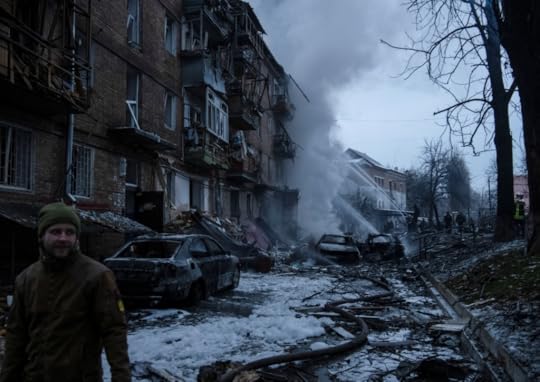
All I can say is: It would appear that many influential and charismatic leaders have an agenda. If I had to guess, that agenda is total regional domination. They will not settle for some type of compromise. They don’t seek peace and understanding. They are stuck in a mentality of the past that favors land dominance over tranquility and free trade. And their methods they think will accomplish this are massive violence and propaganda wars. Terrorism will get them what they want.
If they were explicit about their agenda, they would have a following of absolutely no one. No sane person would put themselves or their family at risk of getting caught or killed if they didn’t think they were doing something for a greater cause. So they are told lies and exaggerations. And they are made grandiose pomises. They could be promised fame. Martyrdom. Financial benefits for their families. Eternal rewards.
Leaders have pledged these rewards and more for committing terrible atrocities for thousands of years. The the only difference between then and now is most of the world has moved on. They’ve discovered the benefits of living in peace with their neighbors. They’ve learned that land expansion or trying to control foreign nations is backwards, ineffectual, and short sighted. They want to live in a world without fear of missiles raining down upon their homes. They want their children to be safe.
A Safe World… Without Terrorism
And maybe someday our neighbors will be able to live like this as well. The old guard will change their minds or die off. The youth will come forward, inevitably educated by the endless amount of knowledge that is readily available for anyone who wants it. The new guard will meet with our leaders and forge a better path for all of our futures.
And we might actually get to live in a world free of terrorism. Free of strife between different groups. A world in which my friends and I don’t have to check the news and our phones hoping and praying we didn’t lose someone close to us.
And in place of anger and hatred, we will have a future of understanding and even camaraderie.
During my glory days hosting dozens of Couch Surfers, I hosted more guests from Germany and Poland than from anywhere else. A generation ago their grandparents may have been literally murdering my ancestors. And now we can sit together in my living room enjoying some scrambled eggs, laughing and appreciating each other’s company. The Jewish people will never forget what’s happened in the past, but that doesn’t mean the next generations can’t be better. It doesn’t mean we can’t get to a new phase in life.
I have no doubt that peace is a possibility. But it all starts with figuring out how we got to where we are now, protecting ourselves as we brave the current reality, and putting down breadcrumbs that will hopefully lead to a bright and beautiful future.
I truly believe it could happen. And I pray it happens soon.


The post The Logic of Terrorism is featured at Jaffe World.
May 16, 2023
E-Squared and the Broken Connection

Enjoy!
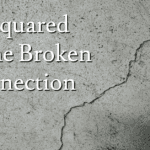
I picked up Pam Grout’s book E-Squared with great enthusiasm. First of all, it’s been a minute since I’ve read some quality self-help. And my ill-fated hunt for employment has left me feeling weak and in need of something to pick me up.
Second, I knew my wife loved the book. Not really any better endorsement than that.
Finally, the description sounded really appealing: “Nine do-it-yourself energy experiments that prove your thoughts create your reality.”
It’s a concept I have trouble not thinking about. Your thoughts create your reality. The idea always feels like the oddest mixture of hippy-dippy mumbo jumbo nonsense… and an absolute and obvious truth. How can something be both of these things at the same time?
A Complex Simplicity
Nevertheless, this simultaneously obvious and wishy-washy notion seems to be the reality I see all around me.
It’s hard to deny it. Some people were born into ultra-complicated situations. And others were beaten down by the world along the way. How could one ignore the realities of divorce, poverty, illness, abandonment, and violence? The world is an objectively crazy place, filled to the brim with hardships.
Yet, some people overcome those hardships. Some persevere despite the crap life has thrown their way.
Some persevere despite the crap life has thrown their way.
Click To Tweet
A really fantastic example: Nicholas James Vujicic
No Arms, No Legs… No Problem
This gentleman was born with no arms or legs. Most of us don’t think about the blessings of just having these simple things in life. Of course I have arms and legs. They’re not blessings. They’re a given!
So we spend our days complaining about anything and everything. It’s too hot outside. My boss is a pain. My internet is loading too slowly.
We could literally be sitting there giddy all day long because we have legs. But we’re too focused on what we don’t have.
Then you have someone like Nicholas. If we had his condition, we’d be miserable. All the time. Life would feel useless. We’d feel sorry for ourselves, day in and day out.
But he’s not like that. He chooses to focus on what he has rather than what he doesn’t have. He lives his life to the fullest. And has created something beautiful because of it. And it’s hard not to be inspired. To walk away from hearing him talk and realize that life is far more than what you’ve thought up to that point.
When Cynicism Runs Supreme
And then it wears off, and cynicism takes over again. We return to our prior misery. We go back to hyper-focusing on everything we don’t have, and haven’t been lucky enough to possess.
But some of us don’t want to be this way. I certainly don’t.
I suffered from crippling sciatica for years, and promised myself that for the rest of my life, I’d be excited just to be able to sit in a chair. But it wore off. I couldn’t sit down–the most basic action in the universe–for a couple of years. Now I do so without a problem. And instead of sitting there feel like I’m showered with blessings, I’ve returned to sitting there… and feeling nothing special at all.
E-Squared?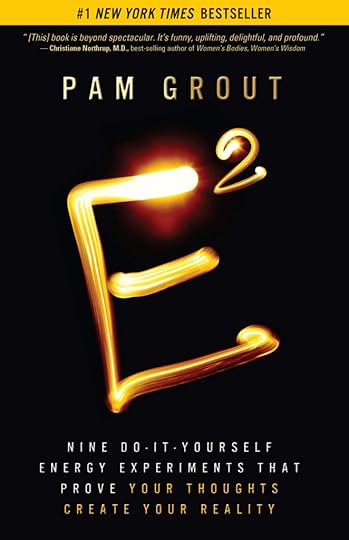
So what does any of this have to do with E-Squared, the book I’m reading?
First and foremost, I’m enjoying the book. I find E-Squared well-written and interesting. I appreciate Pam Grout’s enthusiasm, and find the ideas extremely believable.
But here’s the problem: I’m frustrated. I tried the first two experiments, and they both failed. I even repeated the first one, and gave extra time for the second one. And I came up with nothing.
And I was sorely disappointed.
I understand that in order for things to work, you need to (at least temporarily) shed your skepticism. And I tried. I really did. Not in my nature, but I actually flipped my cynicism on its head, and instead awaited results with rapt enthusiasm.
But those results never came.
Is it Bunk?
Now, there’s only two conclusions I feel I can draw from this. The first is that E-Squared is just feel-good blah blah nonsense. Anyone who believes in the bunk Pam Grout is selling should also enjoy spending time getting their palms read and fiddling with Ouija boards. But it simply isn’t real. You just want it to be real so bad, you are willing to actually convince yourself it’s real.
I remember as a teenager using a Ouija board with some friends. I still have the vision of them freaking out because clearly a cabinet door had moved.
I’m going to tell you a secret.
It did not. Not even a little.
But my friends had convinced themselves it had happened, and now they were panicking, and reacting to some spirit being who wished to impact their lives through subtle door movements.
Is that what happens here? Are the scores of excited readers of E-Squared just gullible sheep who believe something because they want to believe it? Is each and every reader just wasting their time and money?
Or Is It Me?
Or perhaps the problem isn’t the book or the concepts within? Perhaps the problem is me.
This is something I feel like I have to deal with every day. There were times in my life I enjoyed praying. Other times in which I found a level of bliss from meditation. There have been times in my life when I felt some type of powerful connection to God, or whatever you might want to call the spiritual forces in the world. I saw sparks everywhere. Coincidences weren’t coincidences. The moments in my life happened for a reason.
Sadly, that feeling has been beaten out of me by life.
But I wish to cast cynicism to the side. I want to break through the wall that seems to prevent me from seeing something bigger out there in the world.
I’m no longer in tune with something greater than this universe. I’m worried about the pain of a stubbed toe. I’m not conscience that my thoughts and actions might have a deep impact on the world around me, either through the butterfly effect or through some other spiritual impact on the universe.
So, does E-Squared possess oodles of truth? This I cannot yet say. I’d like to think it does. Although thinking of it as one giant lie is a lot easier than accepting the alternative:
The problem is me.


The post E-Squared and the Broken Connection is featured at Jaffe World.
May 7, 2023
Israel and Rockin’ the Friar Lifestyle

Enjoy!

I don’t want to be a friar.
I don’t know if that’s how it’s spelled. To be honest, I really don’t care. The concept disturbs me, and it pains me to waste my time looking up the proper transliteration.
The word is an Israeli concept and as far as I can tell, the best translation is “loser”.
And we’re told in Israel that this is something we should not be.
There are a lot of divisions in Israeli society. The religious and the secular. Left wing and right wing. Ashkenazi and Sephardi.
But none intrigue me like the division between those who get walked upon (the friar) and those who do the walking. It seems it’s the only real difference that matters, and it matters in every walk in life.
Tyrant Over Your Domain
I don’t know if it’s like this in other countries, but in Israel, everyone becomes a tyrant in whatever domain they control. If you’re in charge of a store, you run the place. You and you alone. No one alive could tell you what to do differently. If you let them control you, you are a friar.
Now, you might leave the store you run and find yourself getting told what to do by your spouse. You might find that you have a 500 shekel parking ticket based on some insane machinations by the police that is nearly impossible to refute. And you might get a call from your landlord saying he’s raising your rent by 20%, and if you don’t like it, you can just move.
But when you’re in your store, you are king. No one can tell you what to do.
And the Tyrants are Everywhere!
I felt this effect when I was in the army. In 99% of my experience, people were obnoxiously and aggressively telling me what to do. But the one place I was in charge of, I became a psycho about making sure I ran the show. No one could break my rules. I was the almighty ruler of the useless computer lab!
This effect seems to worm its way into every corner of society.
If you step into a cab, they’re likely going to try to rip you off. You’ll need to decide whether to fight back and get the driver to justly put you on the meter, or just accept what’s happening. Believe it or not, choosing the former might mean getting kicked out of the cab.
When a government office tells you that you owe some small amount of money you clearly do not, you need to decide whether it’s worth the fight. If you fight back, you might win. But it will be at the expense of your time, energy, and a bit of your sanity. You might just give up and say it’s not that much money. They’re counting on this! And when you give up, you are a friar. Someone else wins, you lose, and society continues rocking on.
Why be a Friar
So for those of us blessed with living our lives in the Holy Land, we are ultimately left with three choices:
(a) We can fight our way to the top of the food chain. (b) We can get trampled on throughout our days. (c) Or we can leave.
They’re all viable choices, but how do we decide and what are the consequences of each decision?
Why would someone choose to be a friar?
Well, something happens to you when you decide to be on top, knowing what you need to do to get there.
In my first apartment after moving back to Israel, I had an incident in which my kitchen sink stopped functioning. I contacted the landlord, and the next step was three miserable weeks of nothing getting fixed, some worker making my home filthy, and washing all my dishes in a bathroom.
When I decided I couldn’t take it anymore, I had a yelling match with my landlord’s boss… and my sink was fixed the next day.
But when you scream at someone, you get angry. You become angry. It damages you. And impresses upon you this painful idea that if you want to make things happen in this crazy place, you have to become a different person. And that’s not necessarily the person you want to be.
And to make matters worse, my son was watching me and listening to the whole thing. So I was not only impressing upon myself that I need to learn to fight like an animal to get what I want and need in Israel, but I was teaching this to my son as well, whether I wanted to or not.
Friars and Landlords
And speaking of landlords, it makes me wonder what I would do if I ever found myself on top. What if I were the owner renting out to some poor sucker who couldn’t fathom owning property in this crazy expensive city? Owners can seemingly raise rent by as much as they choose, unregulated by anything except the market and their whims. Would I tell my respectful and reliable tenant they need to pay 20% more the following year or get the hell out, just because I know I have the power to do so and I’ll certainly be able to find someone to replace them?
I’d like to think I would be a good landlord. I would take pride in my home and be very attentive to its needs. I would be cautious about keeping the place in good repair, both because I care about my tenants and because I want the house to retain its quality and appreciate in value.
But what happens the day I see myself on the top of the country’s awkward food chain? Do I let it get to my head and become the mini-tyrant I’ve so learned to loathe as I stood beneath so many of them?
Regardless, if I want to survive in this crazy ecosystem, I need to worm my way to the top of the heap and stop letting the world trample me down. I need to be the one receiving the rent, not the one paying it. I need to be the one standing proudly at the front of the line, not the poor fool at the bank who has watched the last twenty people go ahead of him. I need to shove my way through life, not let myself be tossed from here to there.
Or, of course, I could just leave.


The post Israel and Rockin’ the Friar Lifestyle is featured at Jaffe World.
April 30, 2023
To Faint or Not to Faint: That is the Question

Enjoy!

The story of my first faint.
Several years ago, in Baltimore, I went to give blood at a local synagogue. It was my second time ever… so I was practically a veteran.
The first time I’d given blood, I was already not a youngster. But I was afraid. Extremely afraid. I didn’t like needles. I didn’t like bleeding. And even when I did a simple blood test, I would get extremely nauseous.
And despite the fact that I felt what I felt, nevertheless I was told by numerous sources that it was purely psychological. Not nearly enough blood was taken to have any real physiological effect. It was all in my mind.
First Blood
So I decided to confront my fear head on. I took it to the next level, and gave a whole pint of the sucker. And I did so without incident. I went with a friend, and took every precaution I could think of.
I was 100% completely safe… from everything except my own hubris and naiveté.
The second time I gave blood I had already been tried and tested. I was a master. Able to conquer worlds.
I laid down, they took my blood, and a few moments later I stood up. Proud. Confident. Sure that nothing could stop me, not a damn thing.
And then I dropped to my knees, and my head clonked on the floor. Some nice folk helped me up, and I felt like I had next to no control of my entire system.
First Faint… for Now
This was the first time in my life I ever fainted. It was a very uncomfortable feeling. Somewhere between feeling like you’re hopelessly drunk and like you are powerless, being dragged into another dark dimension.
Unfortunately, this would not be the last time I would faint. Later on, in Kansas, my blood sugar would spike. This caused me to dehydrate and ultimately pass out on the floor of my workplace.
I brought my fainting experiences with me all the way to the Holy Land, where I would pass out another two more glorious times. The first was under the influence of heavy drugs post surgery, and the second was from the immense pain after slamming a finger in a car door.
No, my experiences were certainly not for the faint of heart.
But I don’t have a whole lot of surgeries, and even if I had another, I think we got the situation all figured out. I pretty much have my blood sugar under control, which is obviously a very positive thing. And I’m going to really hope to keep my fingers very far from car doors, or any other situation which could bring about severe pain.
But What About?
Where do things get complicated? In the mighty world of giving blood. The original scenario.
I like giving blood. It’s about the nicest, most selfless act you can do. You inconvenience yourself and make yourself uncomfortable for an afternoon, and this simple and quick act can save up to as many as three lives. Seriously, what in the world can you do that’s better than that?
My son and I gave blood four times this past year, the maximum amount permissible in Israel. That’s 24 potential lives the two of us may have saved, in just one year!
And that’s why I keep going. And I’m going to keep going until they tell me that for some medical reason I’m not allowed.
But if I have to be honest: I suck at giving blood.
Here We Go Again
The last time I went, we traveled quite a bit to find the one place that was open. It was pouring outside and we arrived sopping wet. Because of the rain, we were a little late, and we were very fortunate that even though they were closing up shop, with a bit of assertiveness on our part, they took our blood anyway.
Since they were doing us a favor, I didn’t want any further delays, and I skipped going to the restroom. This was my fatal error. That meant for the entire time they were taking my blood, I needed to go, and it was just getting more urgent.
So when things were all finished, and everything had settled down, I figured it couldn’t hurt if I got up and went to the restroom. And boy was I mistaken.
Long story short: My son and some paramedics would later be pulling me off a bathroom floor, and taking care of me for the next hour or so. They discouraged me going anywhere or even moving so long as my blood pressure remained ridiculously low.
And once again, I got to embarrass myself in front of a bunch of people in an extremely preventable scenario.
What I’ve Learned
I learned a lot from all these experiences. At least, I hope I have. First, on days when I’m giving blood, I should eat and drink a ton. This was definitely not the problem this time, but in any case, the body needs a lot of fuel for the ordeal. And it’s not like eating is much of a challenge…
The second lesson is to always go to the bathroom first, regardless of any time constraints. No excuses.
Finally: Just lie there. Don’t get up. Don’t be a hero. And don’t be stupid. There’s no rush whatsoever. You did something good, and for whatever reason, you suck at the next step. Just embrace who you are and your body’s limitations, and don’t risk the possibility of smacking your skull on the floor and getting permanent brain damage. Yes, you’re doing a good deed. But a concussion would certainly dampen the mood.
But there is a big question left over after all of this.
So Where Do I Go From Here?
Some people aren’t great at doing this. Yes, it’s rare that people faint after giving blood, but it definitely happens. I’m not the first, and I won’t be the last. But it is most certainly the vast minority of people this happens to.
The question is: Do I keep doing it?
I know how to lessen the risks. But that doesn’t eliminate the risks. I definitely want to go back. And the idea of potentially saving another three lives is most certainly pulling me toward another visit. However, I’m not going to lie: It’s super concerning, and I don’t want to ever put my wellbeing at risk. There are too many people in the world relying on me.
I’m leaning toward: Keep going, but stay the hell down until I’m 100%. But I waiver. Maybe the good deed is meant for other people who aren’t risking cracking a skull on the floor of a weird truck in the center of town.
What do you think?


The post To Faint or Not to Faint: That is the Question is featured at Jaffe World.
April 23, 2023
The 5 Traits Needed to Make it in Israel

Enjoy!

I’m asking a big question this week, but I want to preface it by saying the real answer is: I don’t have a clue.
The question:
What does it take to make it in Israel?
It’s something I think about all the time. But let’s first define terms.
Making it in Israel
What do I mean by “making it”?
I mean three things:
First, you come here and stay here. For the long run. And that might be longer than you think. I suspect we can all agree that if someone comes here for a year to study, then decides to stay, they haven’t yet made it in Israel. It’s going to take more time than that. And more experiences.
Second, you’ve faced hardships and still chose to stay.
I left Israel after living here for eight years and suffering countless hardships. You might say that eight years was already impressive. It is not. I loved Israel when I was in school. When I was young and had few responsibilities. Then the challenges started compounding and it was no longer Disney Land for me.
So I left. It wasn’t fun anymore, and I didn’t want to be here. Eight years alone didn’t constitute “making it”.
Finally, you’ve figured things out. You know where you want to live. You have a community you are comfortable in. You can pay the bills, and life is generally sailing smoothly enough. There’s food on the table, and there will be tomorrow as well.
The Philosophy of Israel
Now, that all being said, there are two philosophical approaches that make it much easier to be here as well. If you maintain one or both of them, you are at a decided advantage over those of us who don’t.
If you truly believe that (a) this is God’s chosen place for the Jewish people and we all belong here, or you believe (b) this is historically the only place a Jewish person can be safe, can feel “at home”, then the whole process is easier. Your attitude will color everything else previously mentioned.
You will have great motivation to live here and not want to live elsewhere. You will be able to tolerate the hardships with greater comfort. And you will redefine the comfort you require to have a good life, since it ultimately doesn’t matter. You’re here, so you’re more than willing to make some sacrifices.
But that’s just philosophy.
What are character traits that anyone can develop that I believe are essential for living here?
1) Patience in Israel
First and foremost, patience.
Things don’t happen as quickly as they might elsewhere. Your letter might take two weeks to arrive even though it was sent from a block away. Your paperwork at a government office might get stalled for months. And so many other cases like these. If you have iron patience, you will be able to take it all in stride.
I’m not the most patient person in the world, but there are odd things I’ve learned to like. For example, waiting for an Amazon package. In the States, it might arrive in a couple of days, and exactly when it’s supposed to. Here it might take a couple of weeks to reach its destination, on any random day. It ends up feeling like a surprise present you delivered to yourself and forgot about.
If you are impatient, all of this might drive you crazy.
2) Adaptability is Everything
Adaptability is key. Things are different. Some bizarrely so. And if you dwell too much on those differences, or you let them get to you, you will not be able to survive here. Possibly anywhere other than what you’re fully and completely used to.
There’s nothing wrong with yearning for a few comforts from elsewhere. And you’re allowed to get excited when those comforts finally arrive.
But if you wake up every morning annoyed that there’s no Starbucks, frustrated that people will push to get on a bus, and freaking out because people yell on their cellphone right next to you all day long, you’re in for a lousy ride. If you can learn to just accept the reality and not be bothered if it remains that way, that is classic adaptability.
You don’t have to like it. And you absolutely can hope for changes and even work toward them. But you need to learn to accept that they might not happen. This is just the way it is.
3) Assert Yourself
It’s very easy to be ignored or get walked all over in Israel. Just because you’re at the front of the line (or what loosely resembles a line), doesn’t mean you’re automatically next. And just because you’re in the right, doesn’t mean justice will be served.
So, if it’s your turn and someone goes ahead of you, you’ll need to speak up. If the phone company is telling you they didn’t bill you twice or some government office is telling you an unpaid 13 shekel bill from three decades ago is now 3000 shekels, take a deep breath, and then vigorously argue your case. You may have to cross the line from assertive to aggressive. Your voice might need to be raised. But to survive the Holy Land, don’t get off that phone until you’ve come out on top.
4) Careful and Vigilant
On that topic, it’s a really good idea in Israel to be completely on top of all things. Don’t assume the electric company isn’t double billing you or that your cell provider isn’t charging you monthly for some “perk” you never agreed to.
Sadly, these kinds of things happen. And the only way to deal with them is to be constantly careful and vigilant. Read all the paperwork, save everything, and don’t hesitate to make all the necessary calls to fix the problems when they arise. Don’t stall. If you’re paying close attention, you can stop all these “mistakes” in their tracks.
But if you’re not careful, you’ll be bleeding money and won’t even know it’s happening.
5) Gotta Have Some Thick Skin
Finally, living in Israel requires a certain level of thick skin. Some are born with it, the rest of us need to work hard to build up the character trait.
Fact is, by the end of any given day you might be shouted at, shoved, cut in front of, or almost run over while walking through a crosswalk.
When these things happen, you are always left with the same two choices:
First, stew about it and be angry and upset for the rest of the day.
Or you could let it go and move on.
The second is the better choice, and one classic Israelis excel at. Israelis don’t harbor anger or bitterness. They’re not vengeful. To call them forgiving doesn’t quite cover it, since the moment an incident is over, they’re too busy no longer caring to waste energy on forgiveness.
And this is possibly the single most important character trait for surviving the Israel experience. Learn to let things go, and then you can wander through your day enjoying what Israel has to offer, without being constantly frustrated with what it does not.
Learn to let things go, and then you can wander through your day enjoying what Israel has to offer, without being constantly frustrated with what it does not.
Click To Tweet


The post The 5 Traits Needed to Make it in Israel is featured at Jaffe World.
April 16, 2023
Jerusalem: The Future Needs Some Help

Enjoy!

I am seriously worried about Jerusalem.
The city has made some impressive improvements in the last couple of decades. But if it keeps going on its current trajectory, I don’t think this is at all sustainable.
What am I referring to?
Overcrowded and Trafficky
The overcrowding and the traffic. Which are, obviously, highly connected with one another.
It doesn’t take a long trip to Jerusalem to recognize that something is very imperfect about the Holy City. Whenever we leave the city, I always brace myself for half the trip to be within the city itself. Why? Because driving around in Jerusalem from basically 8 in the morning until around that time at night means back-to-back traffic. So almost anywhere you’ll go will be a miserable and uncomfortable commute.
The whole situation is shocking to me.
When I left Israel in 2005, it felt like very few people had cars. I returned eleven years later to find a country stuffed to the brim with vehicles.
Yes, I also came back to a country with a fairly robust (and affordable) bus system, and trains popping up that have truly altered people’s lives for the better. But it doesn’t change the fact that if you get into your car in the city, you are almost guaranteed lots of traffic, several terrifying near-accident moments, and an awful time trying to park.
Homes and Homes and Homes
During that drive around the city, you will also inevitably drive past dozens of buildings under construction. Yes, some of them will be offices and stores. And those are great, because the city could certainly use more employment. But still, a whole lot of them will be new apartment buildings, or existing buildings with new units being added.
An already over-crowded city, with way too many cars, is constantly adding new homes so more people can move in, and several of them will grab some new vehicles to fill the roads even more.
What could possibly go wrong?
What About Other Cities?
The problems here are exacerbated for me because I pay too much attention to the news, and it highlights how other cities in the world are trying to fix the same problems. But it doesn’t feel like that’s the case here.
For example, what are some ways to deal with vehicle problem? One obvious answer would be for more people to take the bus. If just ten percent of the drivers in the city took a bus instead, it would significantly reduce traffic, it would make parking much easier, and it’s hard to ignore the positive impact on the environment.
But to make this happen, the city would need to somehow increase people’s desire to ride the bus. That’s, of course, kind of hard when the experience isn’t exactly pleasant, and even though one bus ride isn’t so expensive, several every week will definitely start to add up.
Some cities see an unsolvable problem. Others see a challenge, and a solution staring them in the face.
Several cities throughout the US have gone ahead and made local buses free. Imagine the effect in a city like Jerusalem! Of course many people would stick to their cars. That’ll never change. We don’t want people to stop buying or driving cars. We just need fewer cars and fewer cars on the road at any given time, and the net effect would mean significant improvements to the entire city.
I think I can safely assume even commerce would be increased. There have been times in which I chose not to go to town because I feared the parking situation and didn’t want to bother with the annoying bus system. Remove barriers, and next thing you know, my shekels are flying out of my pockets in town. Multiply that by hundreds or even thousands of people, and real, positive changes have been made to a city.
What about housing costs?
Another problem this city faces is unreasonably high housing costs.
It’s honestly outrageous how much it costs to live here. And it’s worse because the city seems void of quality employment. Yes, it’s even more expensive to live in Tel Aviv, but it’s the job hub of the entire country.
Now, one of the reasons the prices are so high is because of foreign property ownership. The prices rise to the people who can spend the most. So if a doctor who lives in New Jersey wants a holiday apartment in Jerusalem, he might be able to afford the extra splurge without a problem. And thus an expensive 3-bedroom apartment sits empty for most of the year, and drives up the prices for the grocery store clerk who actually needs a home for his daily doings.
You might say that this is just the way the world works. Capitalism is a bitch. Some win while others lose.
And there’s truth to that. I am not a fan of over-regulating the market. But this situation is not tenable. How much longer can a city cater to its wealthiest non-residents before those who actually want to live here are no longer capable of doing so?
But Jerusalem is not the first city to have such problems. Canada has the same problem, so the government chose to place a hold on non-residents being able to buy property. This might be enough to drive down costs and make it a more livable country for those who want to be there.
How much longer can a city cater to its wealthiest non-residents before those who actually want to live here are no longer capable of doing so?
Click To Tweet

But where’s our government? Where are the committees dedicated to solving the most pressing problems the city has to offer?
I think of Jerusalem like a bubble that’s about to burst. The problems we have are getting worse every day, and even though there are improvements, they are not coming quick enough to deal with the issues we are facing. When we reach that critical moment, everything will fall apart. And what once was a thriving city will become a wasteland that no one wants to live in.
Now, am I saying we should fully prevent foreign ownership or make all the buses free?
Maybe.
But not necessarily.
All I’m saying is the time has come to put some of Israel’s most brilliant minds to work toward solving these problems. I propose a committee dedicated to uncovering Jerusalem’s most pressing issues, researching similar cities that have successfully dealt with similar problems, and then proposing solutions to the city. And hopefully working hard to implement those solutions right away.
It really can’t wait any longer.
If nothing’s done, sadly, I give the city ten more years before it’s barely livable.


The post Jerusalem: The Future Needs Some Help is featured at Jaffe World.
March 27, 2023
Israel and Anger: What Do We Do With It?

Enjoy!

Israel can be a very complicated place to live.
My first time living here, I was young and starry eyed, barely an ounce of anger. I was excited to be part of the magic. I felt safe and secure, like I’d finally found my true home.
And barely a year or so later, the Second Intifada began, and my life would forever be changed.
Terrorist attacks became a way of life. Many were deadly and the stories dominated the headlines, others were non-lethal, and even though they may have left scores of people with permanent physical and mental scars, we collectively moved on very quickly. We sighed and breathed easier because no one had died.
And life felt like never-ending stress.
You had to be cold as ice to not have walked away a completely different person.
My Army Journal
Over twenty years ago I was keeping a journal. I remember sitting in my room in the army, jotting down thoughts the day after one of my neighbors had been shot and killed during his drive home.
I was consumed with anger.
I pointed a lot of fingers, none as accusingly as the one pointed at the previous Prime Minister, Yitzchak Rabin. It was his “peace” initiatives that enabled and emboldened the enemy, and in my young mind, led directly to the funeral I was about to attend that day.
At the funeral, I saw something I’d never seen before. In fits of anger, some of my neighbors hurled stones at passing Arab vehicles. The opposite was commonplace. But this was quite new to me.
I was bothered, perhaps even disgusted at these random acts of unnecessary violence.
And to this day, I find myself rather perplexed.
Yet Another Terrorist Attack
I will say this right off the bat. You might be upset by some of the things I say in this article. That is, obviously, your right. But please understand that I’m confused. I don’t have a strong stand here. I’m a work in progress, trying to get a better understanding of current events in my country.
You can choose to have intense and strong opinions on this topic. And I might get there someday. But for now, I’m trying to piece together the scores of thoughts and emotions swimming around in my mind.
Recently there was another vicious terrorist attack. A couple of young men were removed from this world way before their time, leaving friends and family to mourn the losses forever. Marriages would never happen. Children would never be born. And a nation once again shakes its head, wondering if this violence and bloodshed will ever come to an end.
Sadly, the attack wasn’t unique.
Terrorism is an expected part of the lives of those of us living in Israel. None of us like it, but all of us have become, to some extent, desensitized to how truly horrific it is to live like this. Anyone, at any moment, can be taken out.
And that’s just how it is.
But what happened next was not common.
The Anger Bubbled Over
Many people living in the area descended upon the village that housed the attack’s perpetrators, and unleashed their fury upon the residents. By the time the smoke cleared, tons of homes were destroyed. Cars were decimated. And one resident died.
Why did they do this? Their anger (inevitably?) bubbled over, and their frustration at a government that cannot solve our security problems became too much. So they took matters into their own hands.
They felt afraid and unprotected. The government had opportunities over the course of the last several decades to improve the country’s security problems, and when they failed, the regular Joe on the street picked up whatever they could and fought back on their own.
This is certainly one way to look at things. One perspective of the “revenge” that was taken.
But I’m not sure if I believe it’s genuine. I think people were angry. Infuriated. And they behaved like wild animals, without any real goals except getting the fury out of their system.
And yet, I’m not sure if I blame them still.
Justifiable Anger?
These weren’t my family members who perished. These weren’t my friends or neighbors taken from the world prematurely. I can’t relate to or judge the level of anger, frustration, and absolute disappointment these people must be feeling. Even if I disagree, and wouldn’t have behaved the same if I were in their shoes, it’s tough to judge anyone who finds themselves in a similar situation.
I can logically explain away their behavior. And I certainly feel the frustration with the security situation in the country.
I lived in Israel through seven years of a murderous, revolting Intifada. I remember Ehud Barak’s empty threats that just poured fuel all over the fiery situation, and the countless empty buildings destroyed that discouraged nothing.
And my fellow countrymen died, one after the other, and all we felt we could do was remain strong, waiting for the next awful news clip or terrifying phone call.
We hoped and prayed our government would figure out how to calm things down. And together with our military, we could crush the problem once and for all.
But salvation never came. And the pain and misery dragged on.
And I am not oppose to vigilantism. I think it has its time and place. Sometimes the wrongdoings are so great, and the official channels are so inefficient, that the regular guy on the street is required to step up.
But It’s Just Wrong
But I nevertheless know what these people did is wrong. And I would hope I would never do the same, nor encourage my own children to behave this way.
Perhaps it’s because there’s a difference between bringing perpetrators to justice vs mostly random acts of violence. Perhaps I still retain a shred of confidence that our beloved military is consistently doing its best and will ultimately conquer the evil in its path.
But I think it’s more than that, and I don’t know yet how to put my feelings into words.
All I know is this: There must be a better way.
How do we find balance?
There has to be a way for people to release highly justified anger. And there very obviously needs to be a way for people to feel safe in their homes and when going from place to place. But this cannot push people into lowering their moral standards or stooping to the level of the enemy they so greatly despise. There needs to be a better way.
How can we find hope and peace in a situation so bleak and filled to the brim with complications?
There needs to be a way for people to feel safe in their homes and when going from place to place. But this cannot push people into lowering their moral standards or stooping to the level of the enemy.
Click To Tweet


The post Israel and Anger: What Do We Do With It? is featured at Jaffe World.
March 20, 2023
5 Reasons Why I’ll Be Running This Week

Enjoy!

I hate running.
I love fitness. I love lifting weights, playing some sports, and making noticeable gains. But running just isn’t for me.
I would say in a year of weight lifting I might feel sore a few times, and every once in a while a joint will bother me for a week or two. But it’s all nothing when I consider the benefits I’m getting despite these few physical risks.
This is very much not the case with running.
Running for a Half HourIf I run for a half hour one time, first off: I’ll hate it. I get little to know pleasure from the experience. But worse than that, I will be sore all throughout my legs and might be forced to do less exercise for the next several days. Basically I’m making everything worse for myself.
Yet I just signed up to run a 5K at the Jerusalem Marathon.
I guarantee you I’m not a masochist… but this does feel like a taste of masochism. Why in the world would I do this to myself?
1) I Need a Win
I need a win. Life has not always been kind. And lately staring in the face of unemployment and a handful of other life difficulties has just left me craving for something I can point at and be proud of.
No, a 5K is not an enormous accomplishment. But it’s an accomplishment nonetheless. It’s an opportunity to say, “Hey, I was able to do that.” And when I consider that I’m a non-runner, who’s not getting any younger, with a bunch of chronic leg issues, I’m looking forward to remembering this as an enormous win I could forever be proud of.
2) Marathon in My Future?
The second reason I want to do this is in preparation for an eventual marathon.
I have a long bucket list. And I’m pretty certain at some point in my life I will look with pride at all the things I accomplished.
But I’ve got a lot of years ahead of me, and the list will not likely get harder. I can master a handgun, shoot for blackbelt in a martial art, or work hard to achieve a PhD at any point, even after I’m older and retired. But the possibility of running a marathon just seems more and more unlikely each year.
Every time I’ve attempted to run, I found myself injured and in a lot of pain. Now I’m 45, and can’t really picture a world in which I can keep trying for much longer.
So I’m running a 5K. Hopefully I’ll finish and I’ll be strong enough to get back in the game just a day or two later. And when I have an opportunity, I’ll go longer. Then longer. And maybe, just maybe, I’ll work my way up to that elusive giant marathon goal.
This might be my last attempt. I don’t want to remove anything from that bucket list. I never have, and I don’t imagine it’ll feel good to do so.
Fingers crossed for this exciting adventure ahead of me!
3) Running is So Damn Hard
I want to master my physical self. I want to be strong, flexible, and have incredible endurance. But getting there isn’t and can never be easy.
Somehow or other, people understand they’ll never get really strong by lifting up five-pound weights and they’ll never get flexible if when trying to touch their toes, they don’t push past their knees.
Yet when it comes to endurance, they think they’ll magically become thin and fit through mindless hours on a recumbent bike or an elliptical machine.
Now, I have no problem with these devices. They have their time and place. They’re far easier on the joints than running, and it’s also good for anyone who wants to be in great shape to have variety in what they do. Not to mention, if you turn up the resistance, these can be great exercises.
But I think the main reason people choose these over running is because they are easy. Running is not. When I do those exercises, I feel like I can go all day. I won’t even break a sweat. But with running, I want to die after just five minutes.
And it’s that difficulty that makes it important.
It just seems obvious that if you want to increase your cardio capability, you need to do things that challenge your cardiovascular system. Running is a huge challenge. And one I want to overcome.
When it comes to endurance, people think they'll magically become thin and fit through mindless hours on a recumbent bike or an elliptical machine.
Click To Tweet

Running is also a vital component of just about every sport.
You might loath running, but if you like playing soccer, basketball, or baseball, you better be good at it.
I hate running. I truly do. But I enjoy most athletic competition. And I understand intuitively that my disdain for running puts me at a distinct disadvantage. If I want to be great or even pretty darn good at any athletic endeavor, I’m going to have to embrace running. I’m going to have to treat it like any other skill worth mastering.
5) The Mental Factor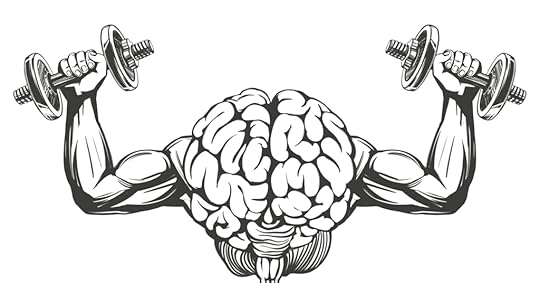
Finally, there’s a certain mental component to running that I can’t ignore.
I noticed this in my first practice run in preparation for the 5K. If you asked me before the run, I would say for me success was going to be 20% endurance and 80% do my calves hold up. But I no longer think that. It’s not that these components are irrelevant. They very much are.
But I noticed that I legitimately wanted to quit literally dozens of times along the way. I didn’t quit… but I really wanted to.
What does that mean?
What I think it means is the cardio is all there. I absolutely can finish this 5K. I might even be able to meet or even exceed my expectations. What I’m not necessarily sure about is whether I’ll have the mental fortitude to push through to the very end.
The mental component is everything.
So the numbers for me are more like 5% cardio, 10% calf survival, and 85% mental strength.
It’s not a physical task. It’s a mental challenge. If I conquer the race, I’ve essentially conquered myself.
And that’s the best reason I can think of to fight through until the very end!


The post 5 Reasons Why I’ll Be Running This Week is featured at Jaffe World.
March 13, 2023
Parents, School, and Setting the Bar Too Low

Enjoy!

As a former teacher, I’m not a fan of parent-teacher conferences. My experiences were usually lackluster. I mean, you have this complex child sitting in front of you for hours every week in school, and you’re supposed to summarize everything the parent needs to know in five minutes, with ten impatient other parents waiting right outside the door.
And generally, the parents I felt I needed to speak with, often didn’t come. So I was basically just praising kids for the evening… which, of course, has its perks, since it’s nice to make a bunch of parents smile.
But I often wondered: Are the parents not coming because their children are challenging, or are their children challenging because they have the kind of parents who don’t come?
Regardless, conferences are even more pointless in this day and age, when it’s never been easier to be in constant communication with parents. They’re always just an email or a WhatsApp message away. If something is important, it’s ludicrous to wait for a 5-minute conference to discuss the matter in person. There’s simply no excuse anymore for lackluster communication.
But, of course, I still go. It’s the convention. It’s what parents are supposed to do, even if they’re inane and outdated.
Even Better Than a Good Grade
But they do have their benefits. Especially when you’ve got good kids, and you enjoy listening to them getting praised.
I’ve noticed patterns in recent years.
Anyone can get a good grade on a test. Some students participate, some don’t. Some have better overall behavior than others. There’s a whole lot of conventional ways to be a “good” student.
But nothing impressed me more with my older two kids than the following two stories.
A Grateful Student
My son’s teacher said he was the only kid who thanked her at the end of every class. That’s right. Dozens of kids pouring in and out of the classroom every single day, and only one expressed his gratitude each and every day. And it was my boy!
Yeah, he was an academic monster. He kicked ass in school like there was no tomorrow. He took on extra classes and it didn’t matter how many additional responsibilities he tossed upon himself. He always conquered.
And yet, it makes no difference to me. Of course I’m proud of all those accomplishments. He earned everything he got and deserves praise galore.
But I believe most smart folk with some focus and hard work can get good grades. But not everyone can be a decent human being.
The ability to show gratefulness, day in and day out, is a greater reflection of his character than any shining good grade at the top of an essay. And that makes me so damn proud.
Most smart folk with some focus and hard work can get good grades. But not everyone can be a decent human being.
Click To Tweet

And a year later, I’m sitting and talking with my daughter’s teacher and she says something similar.
Every morning her teacher asks the students how they are doing. A lovely little tradition. It’s always nice to try to connect with students on a personal level and to show genuine interest in their lives and well-being.
But what happens next?
Well, apparently in the case of most children, absolutely nothing. They answer, and the conversation ends.
But not so with my young lady, who always asks the teacher how she is doing. And her teacher has found this to be very warm and impressive, considering that since she’s become a teacher, my daughter is literally the only student who has ever done so. That’s right. Hundreds of school days every year, dozens of new students. And in all of that, only one kid thought to ask the teacher how she was doing.
And I absolutely love hearing stories like this.
A Good and Decent Kid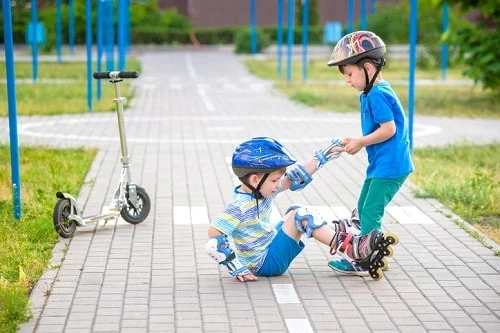
Like I said, academics are wonderful. Super important. School is a place to learn information. To expand your mind. To grow every single day into a more knowledgeable, well-rounded person.
But ideally it’s supposed to be so much more than that. School is about finding a passion for learning. School is about making friends for life and having experiences you will take with you wherever you go, forever. And most of all, school should be about becoming a better person. A more whole individual. Someone who is kind, caring, and generous. School should be facilitating children growing into great adults, people who anyone would want to be around.
So I’m proud.
And I’m happy.
My kids are becoming who I would want them to become. What parent wouldn’t be ecstatic?
Parents Setting the Bar
However, sadly, the cynic within me can’t help but leap into the picture.
How low have we set the bar?
Can it really be that my son is the only one who thanks his teachers? Is it really possible my daughter is the only one who inquires about the well-being of her instructor?
Are the children of this generation so inconsiderate that it takes the simplest act of gratitude or reciprocation to stand out from the crowd?
That is extremely hard for me to believe.
Yet, it’s something I feel every single day.
My gym in recent years has become filled to the brim with teenagers. They’re loud. They have zero spacial awareness. They hoard equipment and never return things. And to be honest, the adults aren’t all that much better.
And whereas I assist customers every single day, and a handful are polite and thankful, the vast majority are demanding and never show an ounce of gratitude.
Enjoying the Benefits of a Low Bar
So yes, I think society is in a downward trend. So much so that all it takes is a few kind words to stand out from the rest. And it’s a bit sad.
I’ve had my day improved by leaps and bounds just from hearing a warm “thank you” from an appreciative customer. That’s all it took. And yet the habit has fallen by the wayside of the masses.
So, world, it’s worth taking a moment to reflect on societal shifts and how people en masse just aren’t prone to treating those around them with kindness. But it’s even more worth it to remember how imperative it is to imprint these character traits upon ourselves.
Saying “thank you” takes very little time or effort. And it’s always free. But those tiny little words can distinguish you from the pack, and can make someone else’s day infinitely better.
I long for a day when it’s a bit harder to stand out. But in the meantime, let’s enjoy how easy it can be to brighten up someone else’s day.


The post Parents, School, and Setting the Bar Too Low is featured at Jaffe World.



